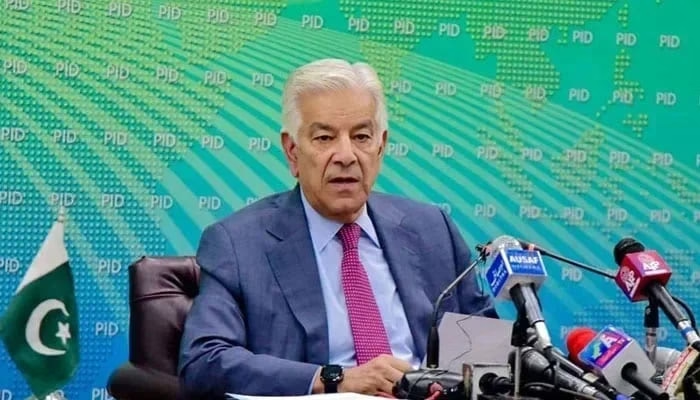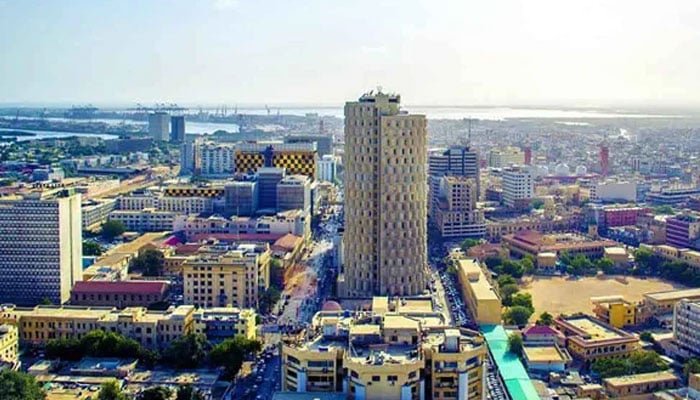Defence Minister Khawaja Asif has praised the current hybrid governance model in Pakistan, stating that it is functioning effectively under the leadership of Prime Minister Shehbaz Sharif. Speaking on Geo News’ talk show Capital Talk Asif described the system as one grounded in consensus between the civilian leadership and the military establishment, which, according to him, has ensured political stability and efficient governance.
A Contrast with the PTI Era
Asif contrasted the current situation with the tenure of former prime minister Imran Khan, during which a similar hybrid model failed, primarily due to mutual distrust between the government and the military.
They never trusted each other,Asif said, referring to the relationship between PTI and the armed forces. So, it was bound to collapse.
He pointed out the ongoing internal discord within PTI as further evidence of the party’s instability. PTI leaders are now openly divided, and their infighting is plain for all to see. I don’t even need to comment — their conflicts speak for themselves,the veteran PML-N leader remarked.
Shocking Revelation About Imran Khan and Bajwa
In a surprising disclosure, Asif claimed that Imran Khan had once approached the President of Pakistan with a proposal to grant former Army Chief General Qamar Javed Bajwa an extension for life. The defence minister offered no additional details but implied that such gestures reflected desperation and inconsistency in Khan’s leadership.
Regional Security and Afghanistan
Turning to regional security, Asif confirmed that Pakistan has provided concrete evidence to the Afghan government regarding the presence and activities of terrorist elements operating from within Afghanistan.
“We have repeatedly asked the Afghan authorities to take action against these elements that are using Afghan soil to launch attacks inside Pakistan,” he said, without naming specific groups.
The issue of cross-border militancy has become a growing concern for Pakistan in recent months, with security forces facing increasing attacks in Khyber Pakhtunkhwa and Balochistan. Asif’s remarks signal that Islamabad expects more tangible cooperation from Kabul.
PPP’s Role and Potential Political Alliance
On the domestic political front, Asif addressed the speculation regarding the Pakistan Peoples Party (PPP) possibly joining the federal government again. He clarified that it is entirely PPP’s choice whether or not to enter into a coalition, but he acknowledged that past cooperation between PPP and the PDM government had been a positive experience.
The working relationship between PPP and the PDM government was smooth and productive,Asif said.
Just a day earlier, in a separate appearance on Geo News, Asif had spoken optimistically about the potential for future cooperation between PML-N and PPP, suggesting that a joint political arrangement could serve the nation’s broader interests.
I’ve been in politics for decades. I can say that if both parties come together and work toward a national agenda, it would be beneficial for the country,he stated.
However, Asif made it clear that his comments were based on political wisdom, not on any ongoing or confirmed negotiations. I am not in a position to provide a roadmap or confirm that discussions are taking place,he clarified. This is just an expression of what could be, based on experience.
Khawaja Asif’s remarks offer insight into the PML-N’s vision for governance, highlighting the importance of collaboration between institutions and strategic political alliances. With Pakistan facing significant internal and external challenges — from economic pressures to regional security threats — the defence minister emphasized the value of stability, unity, and consensus-based decision-making.
As the country navigates complex political waters, Asif’s statements underline the government’s commitment to cooperative governance, both within national borders and with international partners. Whether or not PPP joins the government, and how Afghanistan responds to Pakistan’s security concerns, remains to be seen — but the message from the Defence Minister is clear: national interests must come before personal or party rivalries.



